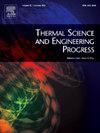A comprehensive techno-eco-environmental investigation of an efficient biodiesel generation procedure through hydrodynamic cavitation
IF 5.1
3区 工程技术
Q2 ENERGY & FUELS
引用次数: 0
Abstract
The growth of cleaner biodiesel generation associated with hydrodynamic cavitation from canola oil via transesterification is acquiring prominence owing to considerably descending energy needs and time. In this work, the conversion of canola oil into biodiesel and glycerol was achieved through the process of transesterification with methanol, employing sodium hydroxide as a catalyst. The newly offered process was investigated from technical, economic, and environmental points of view, and the precision of the results was verified and accepted compared to previously published works. The technical results revealed that the maximum exergy destruction rates as well as exergy efficiency belonged to the transesterification process. The economic study showed that the capital cost of the process was 638.7 MUSD/year. Also, the return period was computed less than 4 years. Moreover, comparison analysis proved that Canola oil proved to be a more advantageous primary material for the production of biodiesel and was more appropriate from the exergoeconomic point of view in comparison to Jatropha oil and other materials. Finally, by increasing the conversion percentage of the reactor, the value of the exergo-environmental index and the factor of exergy stability increased significantly, which was considered as an advantage from an environmental standpoint.
通过流体动力空化技术生成高效生物柴油的综合技术-生态-环境研究
由于能源需求和时间大大降低,从菜籽油中通过酯交换反应产生与流体动力空化相关的清洁生物柴油的发展日益突出。在这项工作中,采用氢氧化钠作为催化剂,通过与甲醇进行酯交换反应,将菜籽油转化为生物柴油和甘油。研究人员从技术、经济和环境的角度对新提供的工艺进行了研究,与之前发表的作品相比,结果的精确性得到了验证和认可。技术研究结果表明,酯交换工艺的放能破坏率和放能效率最高。经济研究表明,该工艺的资本成本为 638.7 MUSD/年。此外,计算得出的回报期少于 4 年。此外,比较分析表明,菜籽油被证明是生产生物柴油的一种更有利的主要材料,与麻风树油和其他材料相比,从经济效益的角度来看更合适。最后,通过提高反应器的转化率,能源-环境指数值和能源稳定性系数显著增加,从环境角度来看,这被认为是一种优势。
本文章由计算机程序翻译,如有差异,请以英文原文为准。
求助全文
约1分钟内获得全文
求助全文
来源期刊

Thermal Science and Engineering Progress
Chemical Engineering-Fluid Flow and Transfer Processes
CiteScore
7.20
自引率
10.40%
发文量
327
审稿时长
41 days
期刊介绍:
Thermal Science and Engineering Progress (TSEP) publishes original, high-quality research articles that span activities ranging from fundamental scientific research and discussion of the more controversial thermodynamic theories, to developments in thermal engineering that are in many instances examples of the way scientists and engineers are addressing the challenges facing a growing population – smart cities and global warming – maximising thermodynamic efficiencies and minimising all heat losses. It is intended that these will be of current relevance and interest to industry, academia and other practitioners. It is evident that many specialised journals in thermal and, to some extent, in fluid disciplines tend to focus on topics that can be classified as fundamental in nature, or are ‘applied’ and near-market. Thermal Science and Engineering Progress will bridge the gap between these two areas, allowing authors to make an easy choice, should they or a journal editor feel that their papers are ‘out of scope’ when considering other journals. The range of topics covered by Thermal Science and Engineering Progress addresses the rapid rate of development being made in thermal transfer processes as they affect traditional fields, and important growth in the topical research areas of aerospace, thermal biological and medical systems, electronics and nano-technologies, renewable energy systems, food production (including agriculture), and the need to minimise man-made thermal impacts on climate change. Review articles on appropriate topics for TSEP are encouraged, although until TSEP is fully established, these will be limited in number. Before submitting such articles, please contact one of the Editors, or a member of the Editorial Advisory Board with an outline of your proposal and your expertise in the area of your review.
 求助内容:
求助内容: 应助结果提醒方式:
应助结果提醒方式:


